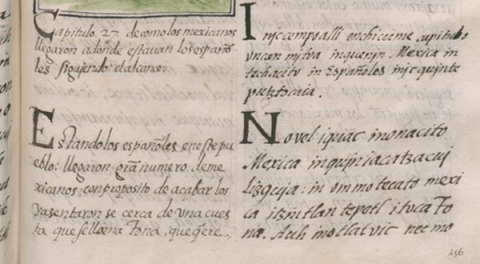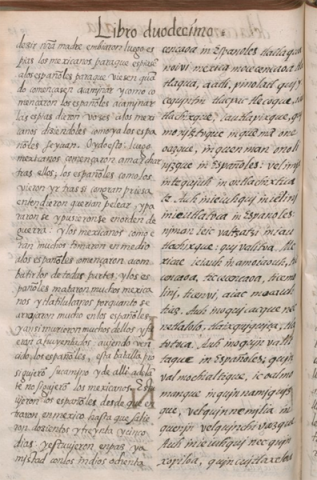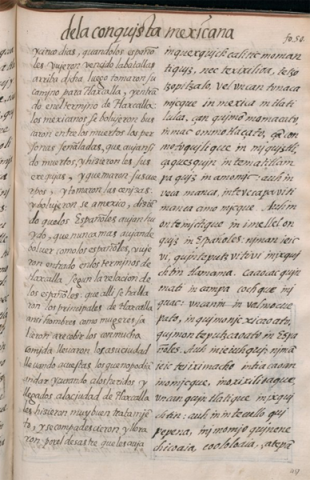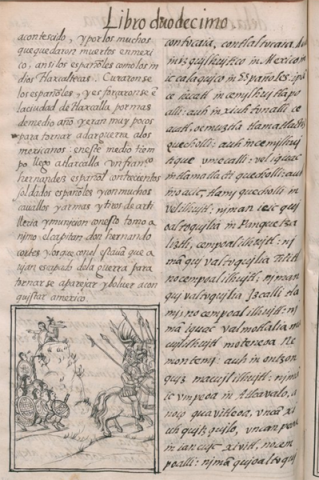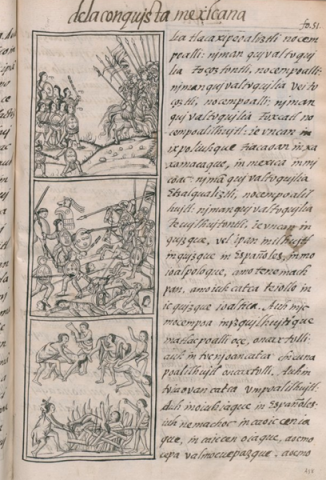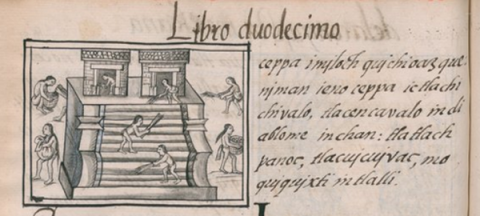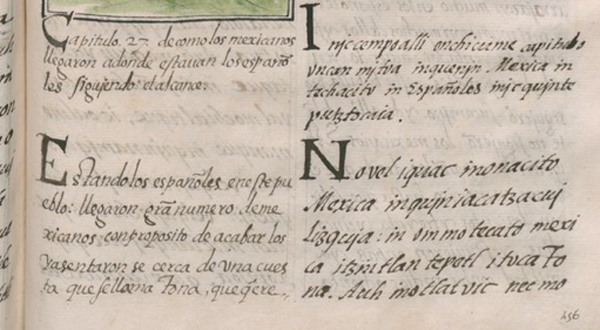 |
[Transcription of the Nahuatl (right-hand column) by James Lockhart:]
[f. 49r., cont.] Inic cempoalli onchicume capitulo vncan mitoa in quenin Mexica intech acito in Españoles inic quinteputztocaia.
No vel iquac in onacito Mexica in quiniacatzacuilizquia: in ommotecato mexica itzintlan tepetl itoca Tona. Auh in otlatvic nec mo
|
[Translation of the Nahuatl (right-hand column) by James Lockhart:]
Twenty-seventh chapter, where it is said how the Mexica caught up to the Spaniards when they were following after them.
Also at the very same time, the Mexica got there, wanting to intercept [the Spaniards]; they established themselves at the foot of the mountain named Tonan. When dawn came,
[Translation of the Spanish (left-hand column) by James Lockhart:]
Chapter Twenty-seven, of how the Mexica, in pursuit, arrived where the Spaniards were.
While the Spaniards were in this settlement, a great number of Mexica arrived with the intention of finishing them off. They took up a position close to a hill called Tonan, which means
|
[Translation of the Nahuatl into Spanish by Fr. Bernardino de Sahagún; transcription of the Spanish (left-hand column) by James Lockhart:]
[f. 49r., cont.] Capitulo .27. de como los mexicanos llegaron adonde estauan los españoles siguiendo el alcance.
Estando los españoles en este pueblo: llegaron grā numero de mexicanos con proposito de acabarlos y asentaronse cerca de vna cuesta que se llama Tona, que q̓ere
|
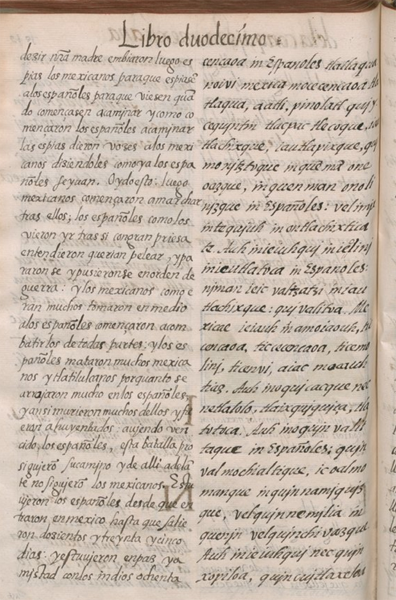 |
[Transcription of the Nahuatl (right-hand column) by James Lockhart:]
[f. 49v.] cencaoa in Espanoles tlatlaqua: no ivi mexica mocecencaoa tlatlaqua,aatli pinolatl quiy: cequintin tlacpac tlecoque, iautlachixque, iautlapixque, quimonitztoque in quēmā oneoazque, in quenman onolinizque in Españoles: vel imixintequiuh in ontlachixticate.
Auh in ie iuhqui in ie olini in ie utlatoca in Espanoles: niman ie ic valtzatzi in iautlachixque: quivalitoa. Mexicae ie iauh in amoiaouh, ticcencaoa, ticcecencaoa, ticemolini, ticenvi, aiac mocauhtiaz. Auh in oquicacquenec netlalolo, tlaixquiquiça, tlatotoca.
Auh in oquinvalittaque in Españoles: quinvalmochialtique, ic oalmomanque in quinnamiquizque, vel quinnemilia in quenin vel quinchivazque. Auh in ie iuhquinec quinxopiloa, quincuitlaxeloa
|
[Translation of the Nahuatl (right-hand column) by James Lockhart:]
the Spaniards readied themselves and ate, and the Mexica likewise readied themselves and ate and drank; they drank a maize and chia beverage. Some climbed to the top [of the mountain] and looked out for the enemy, observed the enemy, looking to see when the Spaniards would break camp and make their departure; those who were watching kept their eyes peeled.
And when the Spaniards were getting going, were on the road, then the look-outs shouted down, saying, “Oh Mexica, your enemies are going! We must prepare ourselves, each and every one, we must all get going and be on our way; no one must stay behind.” And when they heard this, everyone ran, scurried back and forth, hastened.
And when the Spaniards saw them coming, they waited for them, they set themselves up to encounter them, considering well how they would be able to handle them. When it was time, they charged at them;
[Translation of the Spanish (left-hand column) by James Lockhart:]
"our mother." Then the Mexica sent spies to keep watch on the Spaniards and see when they should take the road.
When the Spaniards started on their way, the spies cried out to the Mexica telling them that the Spaniards were already leaving. When they heard this, the Mexica immediately began to march after them.
The Spaniards, seeing them coming behind them in great haste, understood that they wanted to fight, and stopped and placed themselves in battle order. Because there were many of the Mexica, they surrounded the Spaniards and began to fight them on all sides. The Spaniards killed many Mexica and Tlatclolca because they hurled themselves at them so, and thus many died, and they were put to flight. Having won this battle, the Spaniards continued on their way, and from there forward the Mexica did not follow them.
From the time the Spaniards entered until they left, they were in Mexico 235 days, and for
|
[Translation of the Nahuatl into Spanish by Fr. Bernardino de Sahagún; transcription of the Spanish (left-hand column) by James Lockhart:]
[f. 49v.] dezir n̄r̄a madre embiaron luego espias los mexicanos para que espiasē a los españoles para que viesen quādo començasen a caminar
y como començaron los españoles a caminar las espias dieron vozes a los mexicanos diziendoles como ya los españoles se yuan. Oydo esto: luego* mexicanos començaron a marchar tras ellos;
los españoles como los vieron yr tras si con gran priesa entendieron querian pelear, y pararonse y pusieronse en orden de guerra: y los mexicanos como eran muchos tomaron en medio a los españoles començaron a combatirlos de todos partes: y los españoles mataron muchos mexicanos y tlatilulcanos por quanto se arrojaron mucho en los españoles; y ansi murieron muchos dellos y fueron ahuyentados: auiendo vencido, los españoles, esta batalla prosiguierō su camino y de alli adelāte no siguierō los mexicanos.
Estuuieron los españoles desde que entraron en mexico hasta que salieron dozientos y treynta y cinco dias: y estuuieron en paz y amistad con los indios ochenta
----------
*LUEGO. A "los" is missing after this word.
|
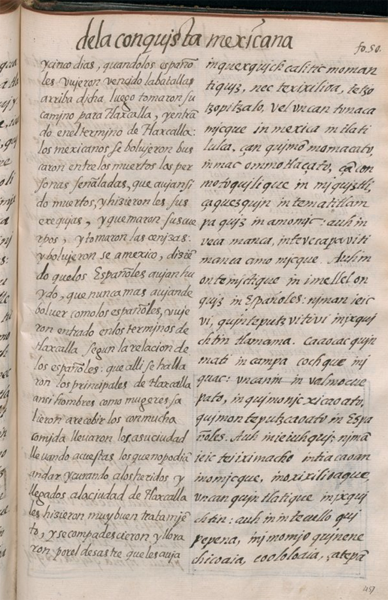 |
[Transcription of the Nahuatl (right-hand column) by James Lockhart:]
[f. 50r.] in quexquich calitic momantiquiz, nec texixilioa, tetzotzopitzalo, velvncan tonacamicque in mexica in tlatilulca, çan quimōmomacato, inmac ommotlaçato, çā conmotoquilique inmiquiztli, ça quezquin in tematitlampa quiz in amo mic:auh in veca manca, in tevecapavitimanca amo micque.Auh in ontemictique in imellel onquiz in Españoles: niman ie ic vi, quinteputzvitivi in ixquichtin tlamama. Caaocac quinmati in campa cochque in iquac: vncan in invalmocuepato, in quimonicxicaoato, quimonteputzcaoato in Españoles.
Auh in ie iuhqui: nimā ie ic teiiximacho in tiacaoan in omicque, in oxixilioaque, vncan quintlatique in ixquichtin: auh in intecullo quipepena, in imomio quinenechicoaia, coololoaia, çatepā
|
[Translation of the Nahuatl (right-hand column) by James Lockhart:]
all those who had been in the houses rushed out among them, stabbing and piercing. Mexica and Tlatelolca died there in great abundance. They simply gave themselves to them, they hurled themselves into their hands, they pursued death. There were only a few who escaped death at their hands. But those who stayed far away, who kept dealing with them from afar, did not die. And when the Spaniards had done the killing and vented their wrath, they went off, with all the bearers following behind. No one knows where they spent the night at that time. There [the Mexica] turned back; they stopped tracking the Spaniards and left them behind.
At this point the warriors who had died, who had been stabbed, were identified, and they burned them all there. They picked among their ashes, collecting their bones and piling them up. Afterward
[Translation of the Spanish (left-hand column) by James Lockhart:]
85 days they were in peace and friendship with the Indians.
When the Spaniards had won the battle mentioned above, they set their course for Tlaxcala, going into the Tlaxcalan jurisdiction. The Mexica went back, looking among the dead for those who were celebrated; they performed their funeral rites for them, burned their bodies, took the ashes, and returned to Mexico, saying that the Spaniards had fled and were never going to return again.
According to the reports of the Spaniards who were there, when they had entered the jurisdiction of Tlaxcala, the important people of Tlaxcala, men as well as women, came out to receive them with much food. They took them to their city, carrying on their backs those who could not walk, and treating the wounded. Upon reaching the city of Tlaxcala they treated them very well; they grieved and wept over the disaster that had befallen them
|
[Translation of the Nahuatl into Spanish by Fr. Bernardino de Sahagún; transcription of the Spanish (left-hand column) by James Lockhart:]
[f. 50r.] y cinco dias,*
quando los españoles vuieron vencido la batalla arriba dicha luego tomaron su camino para Tlaxcalla, y entrādo en el termino de Tlaxcalla: los mexicanos se boluieron buscaron entre los muertos las personas señaladas, que auian sido muertos, y hizieronlos sus exequias, y quemaron sus cuerpos, y tomaron las cenizas: y boluieronse a mexico, diziēdo que los Españoles auian huydo, que nunca mas auian de boluer
como los españoles, vuieron entrado en los terminos de tlaxcalla segun la relacion de los españoles: que alli se hallaron los prinicpales de Tlaxcalla ansi hombres como mugeres salieron a recebirlos con mucha comida lleuaronlos a su ciudad lleuando a cuestas los que no podiā andar y curando a los heridos y llegados a la ciudad de Tlaxcalla les hizieron muy buen tratamiēto, y se compadescieron y lloraron por el desastre que les auia
----------
*OCHENTA Y CINCO. The number given is larger than the total of the days and months listed, which even counting Teucilhuitl as a whole month comes to 215 or 216, depending on what is counted. The discrepancy arises from the omission of the month of Atemoztli between Panquetzaliztli and Tititl toward the beginning.
|
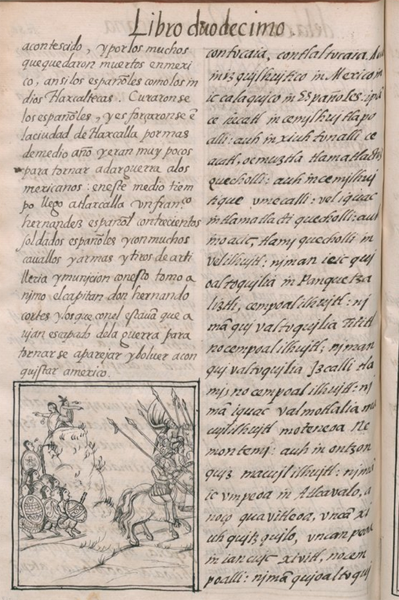 |
[Transcription of the Nahuatl (right-hand column) by James Lockhart:]
[f. 50v.] contocaia, contlaltocaia.
Auh in izquilhuitico in Mexico inic calaquico in Españoles: ipā ce hecatl in cemilhuitlapoalli: auh in xiuhtonalli ca acatl, oc muztla tlamatlactiz Quecholli: auh in cemilhuitique vme calli: vel iquac in tlamatlacti quecholli: auh in oacic, tlami quecholli in vel ilhuitl: nimanie ic quioaltoquilia in Panquetzaliztli, cempoalilhuitl: nimā quivaltoquilia Tititl no cempoalilhuitl; niman quivaltoquilia Izcalli tlami, no cempoalilhuitl: nimā iquac valmotlalia macuililhuitl moteneoa Nemontemi: auh in ontzonquiz macuililhuitl: nimā ic vmpeoa in Atl cavalo, anoço quavitl eoa, vncā xiuhquitzquilo, vncan peoa in iancuic xivitl, no cempoalli: nimā quioaltoqui
|
[Translation of the Nahuatl (right-hand column) by James Lockhart:]
they buried them, buried them in the ground.
Here are the days that have passed since the Spaniards entered Mexico on the day count One Wind and the year count One Reed, one day before the tenth day of [the month of] Quecholli. When they had been here a day, it was Two House, exactly the tenth day of Quecholli. And on the very day that the end of Quecholli arrived, Panquetzaliztli followed after it, for twenty days; then Tititl followed it, also for twenty days; then Izcalli, the end [of the year], followed, also for twenty days. Then at that time were put five days called Nemontemi, and at the end of the five days began Atl cahualo, or Quahuitl ehua, when the year is taken hold of and the new year begins, also twenty days; then followed
[Translation of the Spanish (left-hand column) by James Lockhart:]
and for the many who had been left dead in Mexico, Spaniards as well as Tlaxcalan Indians.
The Spaniards healed their wounds and gathered strength in the city of Tlaxcala for more than half a year. There were too few of them to give battle to the Mexica again.
During this interval a Francisco Hernández, Spaniard, arrived in Tlaxcala with three hundred Spanish soldiers and many horses, weapons, pieces of artillery, and munitions. With this, Captain don Hernando Cortés and those who were with him, having escaped from the war, took courage to outfit themselves again and conquer Mexico back.
|
[Translation of the Nahuatl into Spanish by Fr. Bernardino de Sahagún; transcription of the Spanish (left-hand column) by James Lockhart:]
[f. 50v.] acontescido, y por los muchos que quedaron muertos en mexico, ansi los españoles como los indios Tlaxcaltecas.
Curaronse los españoles, y enforçaronse ē la ciudad de Tlaxcalla por mas de medio año y eran muy pocos para tornar a dar guerra a los mexicanos:
en este medio tiempo llego a tlaxcalla vn franco. hernandez español con trecientos soldados españoles y con muchos cauallos y armas y tiros de artilleria y municion con esto tomo animo el capitan don hernando cortes y los que con el estauā que auian escapado de la guerra para tornarse aparejar y boluer a conquestar a mexico.
|
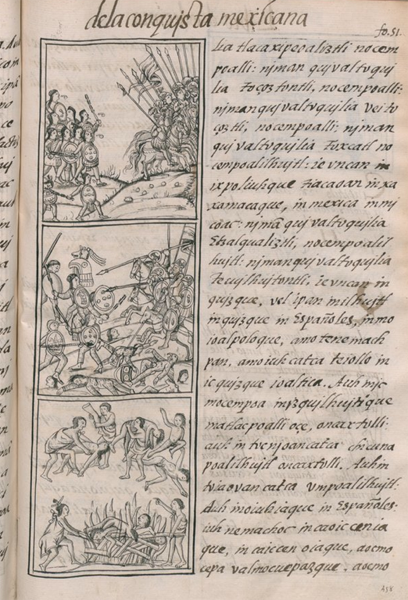 |
[Transcription of the Nahuatl (right-hand column) by James Lockhart:]
[f. 51r.] lia tlacaxipeoaliztli no cempoalli: niman quivaltoquilia Toçoztontli, no cempoalli: niman quivaltoquilia vei teçoztli, no cempoalli: niman quivaltoquilia Toxcatl nocempoalilhuitl: ie vncan ixpoliuhque Tiacaoan in xaxamacaque, in mexica in micoac: nimā quivaltoquilia Etzalqualiztli, no cempoalilhuitl: niman quivaltoquiliaTecuilhuitontli, ie vncan in quizque, vel ipan in ilhuitl inquizque in Españoles, in moioalpoloque, amo tenemachpan, amo iuh catca teiollo inic quizque ioaltica. Auh inicmocempoa in izquilhuitique matlacpoalli oçe, oncaxtolli:* auh in tocnioan catca chicunapoalilhuitl oncaxtolli. Auh in toiaovan catca vmpoalilhuitl:**
Auh in o iuh iaque in Españoles: iuh nemachoc in ca o ic cen iaque, in ca ic cen oiaque, aocmo cepa valmocuepazque, aocmo
----------
*MATLACPOALLI OÇE, ONCAXTOLLI. The number given is larger than the total of the days and months listed, which even counting Teucilhuitl as a whole month comes to 215 or 216, depending on what is counted. The discrepancy arises from the omission of the month of Atemoztli between Panquetzaliztli and Tititl toward the beginning.
**VMPOALILHUITL. Note the discrepancy between the Spanish and the Nahuatl versions on the number of days of peace.
|
[Translation of the Nahuatl (right-hand column) by James Lockhart:]
Tlacaxipehualiztli, also twenty; then followed Toçoztontli, also twenty; then followed Huei toçoztli, also twenty; then followed Toxcatl, also twenty days. At this time the warriors who were cut to pieces perished; many Mexica died. Then followed Etzalqualiztli, also twenty days; then followed Teucilhuitontli. At this time the Spaniards came out, right on the day of the festivity; they disappeared by night, without anyone being aware. People had not realized they would come out at night. The total of all the days that passed is 235. They were our friends for 195 days, and our enemies for 40 days.
And when the Spaniards had gone, it was thought that they had gone forever, that they would never comeback, never
[Translation of the Spanish (left-hand column) by James Lockhart:]
(intentionally blank)
|
[Translation of the Nahuatl into Spanish by Fr. Bernardino de Sahagún; transcription of the Spanish (left-hand column) by James Lockhart:]
[f. 51r., tres dibujos; sin texto en español]
|
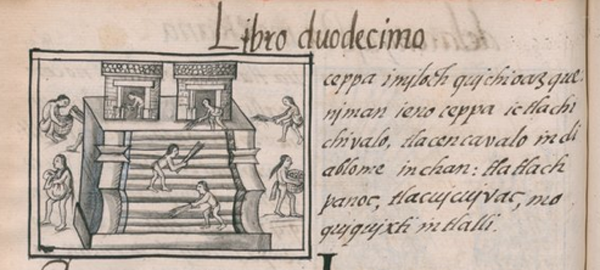 |
[Transcription of the Nahuatl (right-hand column) by James Lockhart:]
[f. 51v.] ceppa imiloch quichioazque: niman ie no ceppa ic tlachichivalo, tlacencavalo in diablome inchan: tlatlachpanoc, tlacuicuivac, moquiquixtiin tlalli.
|
[Translation of the Nahuatl (right-hand column) by James Lockhart:]
make a return. Then again the homes of the devils were fixed up and ornamented; they were swept and cleaned out, and the earth was removed.
[Translation of the Spanish (left-hand column) by James Lockhart:]
(intentionally blank)
|
[Translation of the Nahuatl into Spanish by Fr. Bernardino de Sahagún; transcription of the Spanish (left-hand column) by James Lockhart:]
[f. 51v., un dibujo; sin texto en español]
|
